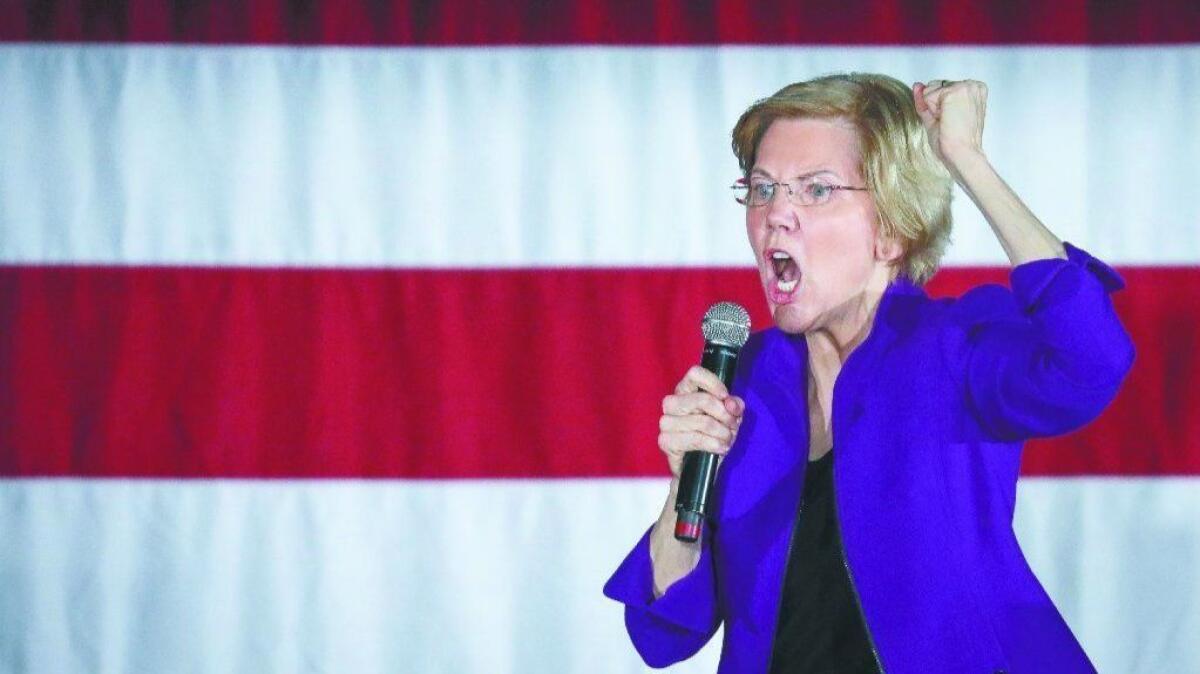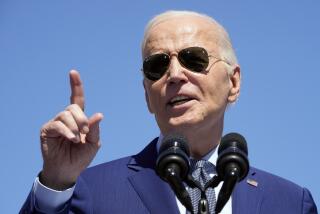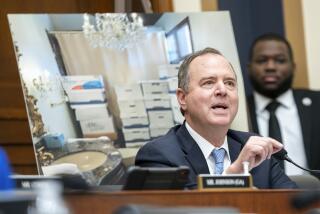Column: Most 2020 Democrats say capitalism is a system that needs fixing

In these early weeks of the presidential campaign, Democratic candidates have faced a battery of unusual questions, prompted partly by President Trump’s dark warning in his State of the Union address against “new calls to adopt socialism in our country.”
The first question Democrats got after that was easy: Are you a socialist? Bernie Sanders said yes; everyone else said no.
The second was not so expected: Are you a capitalist?
Elizabeth Warren had the quickest answer. “I am a capitalist to my bones,” she said. “I believe in markets. What I don’t believe in is theft.”
Others agreed, declaring themselves capitalists — just discontented ones.
“I’m a capitalist,” Beto O’Rourke declared. “Having said that, it is clearly an imperfect, unfair, unjust and racist capitalist economy.”
One maverick, John Hickenlooper, rebelled. “I think it’s kind of a silly question,” he said.
Who’s running for president and who’s not »
But once the candidates started explaining what they think about the economy, it wasn’t silly after all.
The future of capitalism — whether it’s working for most Americans, why its benefits are so unequally shared, and how it can be fixed — is one of the central political questions of our time.
For Warren, a fierce critic of the financial system, the main defect of capitalism is lax rules. In her telling, deregulation of banks and Wall Street led to the crash of 2008 and produces unfair outcomes today.
“I love what markets can do,” she told a TV interviewer. “I love what functioning economies can do. They are what make us rich; they are what create opportunity. But only fair markets, markets with rules. Markets without rules is about the rich take it all, it’s about the powerful get all of it. And that’s what’s gone wrong in America.”
Kamala Harris and others have sounded similar populist themes.
“People who have worked hard and gained success.… I applaud that,” Harris said in New Hampshire last month. “But we must all recognize that the rules aren’t applying equally to all people.”
Former Vice President Joe Biden, who’s expected to announce his candidacy next month, has offered a softer version, calling on capitalists to assume “moral responsibility” for a lack of fairness in the economy.
“I don’t begrudge anybody making a million or hundreds of millions of dollars,” Biden told students at the University of Pennsylvania. “But I do think there’s some shared responsibility, and it’s not being shared fairly…. What happened to a moral responsibility, to a moral capitalism?”
Meanwhile, in the democratic socialist camp, Sanders argues that it’s time to elevate “economic rights” to the level of traditional constitutional rights.
“We have political, freedom of religion, and all of that is enormously important. But you know what we don’t have? We don’t have guarantees regarding economic rights.”
No other candidate uses that kind of language.
The candidates have issued a blizzard of proposals to illustrate what they’d do to make capitalism fairer.
Sanders has proposed a guaranteed employment program that would create an estimated 15 million federally funded jobs; a government-run single-payer health insurance system, Medicare for All; and a long list of tax increases to pay for it all.
Warren has called for changes in corporate governance, including an “Accountable Capitalism Act” that would require large firms to put employee representatives on their boards and consider the interests of workers and communities, not only shareholders, in their decisions.
Cory Booker has proposed “baby bonds” that would create a $1,000 government-funded savings account for every newborn child and add more every year for low-income children — a way to reduce the wealth gap between rich and poor.
Harris’ main economic proposal would provide tax credits to low- and middle-income families — up to $3,000 per person each year to as many as 80 million Americans in a direct redistribution of income.
There’s more, of course — but these are merely proposals. Few are likely to become law in their current form, no matter who’s elected president next year. Their main function is to give voters a sense of where each candidate’s heart is.
What’s most important is not the differences, but the common themes. They show almost every Democratic candidate focused on the same challenge: How to make capitalism deliver its benefits to more people, especially those left behind.
And they’re relatively ambitious proposals, with larger goals than the incremental policies of the Bill Clinton and Barack Obama presidencies.
There may be the rough outline of a new consensus here, Jared Bernstein, an economist at the liberal Center on Budget and Policy Priorities and former advisor to Biden, told me.
“We have a strong economy, but it isn’t working for everybody,” Bernstein said. “We can craft policies to reconnect economic growth to the fortunes of ordinary working people, and we can do that without dampening growth at all.”
But with the exception of Sanders, these Democrats aren’t socialists, no matter what Trump says. Their avowed goal is to make capitalism work better — just as Democrats have tried to do since Franklin D. Roosevelt.
More to Read
Get the L.A. Times Politics newsletter
Deeply reported insights into legislation, politics and policy from Sacramento, Washington and beyond. In your inbox three times per week.
You may occasionally receive promotional content from the Los Angeles Times.







